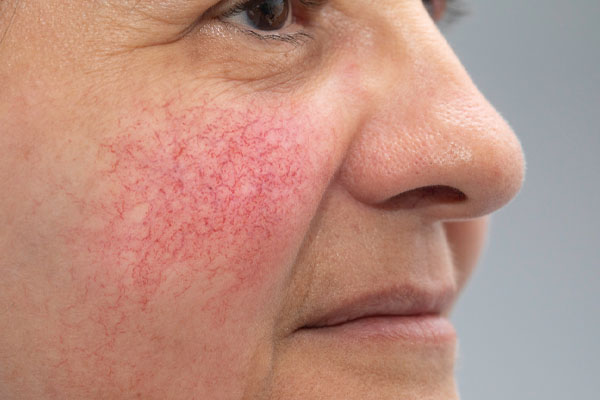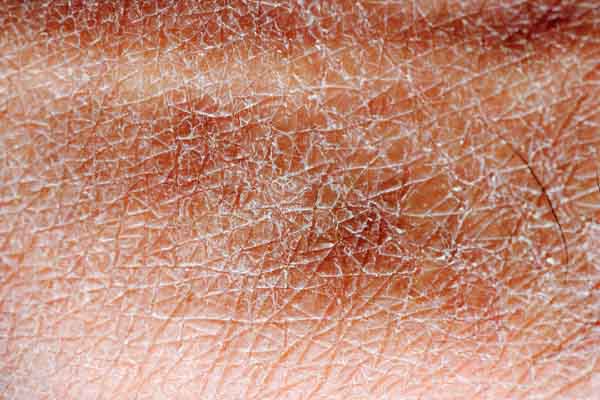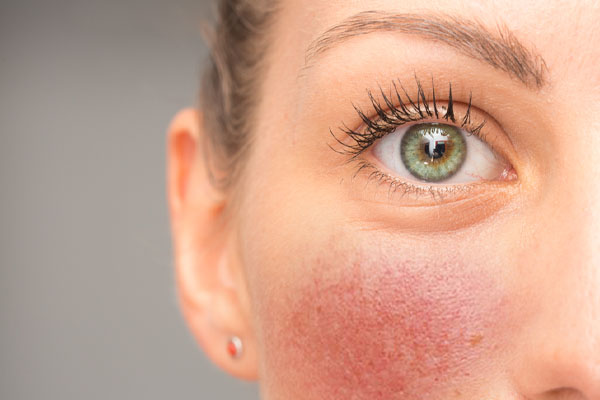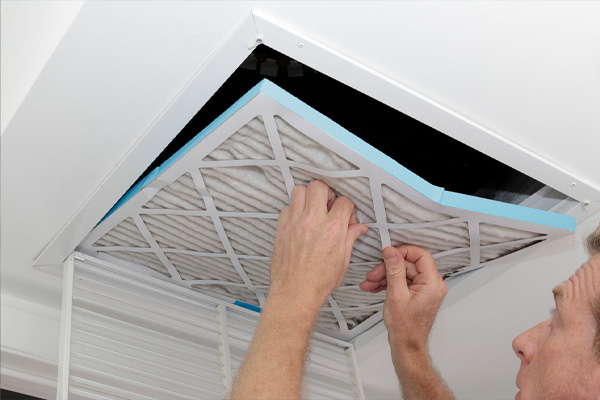How Does Your HVAC Affect Your Skin?

Your HVAC system regulates your home’s temperature and keeps indoor humidity at a balanced level. Without this equipment, most homes would be too hot in the summer, too cold in the winter, and downright muggy. However, although you can count on your heater or air conditioner to maintain comfortable, habitable conditions inside, you can’t always trust it to be gentle on your skin. This is especially true in homes with central, forced-air heating systems. Read on to find out how using your HVAC system may be affecting the look, health, and all-around integrity of your body’s protective covering.
HVAC and Skin Issues: What You Should Know
Contents
Keep reading to explore some of the top HVAC and skin issues that homeowners experience.
Excessive Drying

If you have excessively dry skin in the winter, you probably attribute it to the cold, dry conditions outdoors. However, the same heating system that’s drying your nose out, causing your sinuses to become blocked, and giving you dry mouth while sleeping, is probably drying your skin out as well. If your heater is responsible for causing the occasional nighttime nosebleed, it could be wreaking havoc on your skin.
Unlike the radiant heat that comes from in-floor heating systems and radiators, the warm air that furnaces produce dries indoor moisture out, much like a hair dryer, clothes dryer, or open stove will. Unfortunately, furnaces don’t have features or functions for adding moisture back into buildings when too much is lost. If you have dry, cracked hands, recurring problems with eczema, or dry, cracked lips, insufficient indoor humidity is the most likely culprit. Talk to your HVAC contractor about a whole-house humidifier.
Dramatic Temperature Changes & Red, Ruddy Complexions

Modern humans are conditioned to remain in fairly static environments. Whether you’re at work or at home, you’re probably in a space that’s kept close to 70 degrees Fahrenheit. Stepping outdoors into freezing or sweltering temperatures comes as an absolute shock. It’s almost unbearable to sit in a cold car before the heater has kicked into action, or to wait for your air conditioner to come on when your steering wheel, seats, and seat belts are hot to the touch. When your internal thermostat isn’t acclimated to change, even small increases or decreases in temperature can feel like a big deal.
For this and other reasons, moving from extremely hot or cold environments into a more moderate indoor climate can leave your face looking red and ruddy. Although slight flushing can be aesthetically appealing in some instances, it’s an indication of fast-dilating blood vessels, and it may be a precursor to eczema or rosacea. To protect your skin, try building your tolerance to temperatures that are slightly cooler or warmer than the norm. This way, you can maintain temperatures in your home that aren’t shockingly different from the temperature outside.
Excess Moisture & Skin Rashes
Creating excessively dry indoor air isn’t the only way your HVAC system can cause skin problems. Whether poorly maintained or incorrectly sized for the service area, your air conditioner could be leaving you with too much moisture indoors. This is likely the case if your home is cool when the air conditioner is on but still feels muggy or clammy.
Too much moisture can cause skin rashes, acne breakouts, clogged pores, and more. Solving the problem could be as easy as changing your HVAC air filter. However, if you’ve got a large household and if there are frequent hot showers and steamy cooking projects taking place, your AC system might not be up to the task of humidity regulation. Be sure to discuss this with your HVAC contractor, as they can recommend the best solution for your particular situation. For example, some may recommend a whole-house dehumidifier, a higher MERV rating, or other recommendations.
Decreases in the Natural Production of Oil
Excessively dry indoor air can actually affect the way in which your skin cares for itself. If your living environment is constantly too dry, you may notice that your skin is producing a lot less oil. This can lead to premature skin aging by expediting the formation of fine lines and wrinkles.
How to Stop Your HVAC System From Negatively Affecting Your Skin

In the winter, one of the best ways to protect your skin from the ravages of high indoor heat is by staying hydrated. Drink plenty of water throughout the day and limit your intake of caffeine. Eat plenty of water-dense, vitamin-rich foods like fresh fruits and vegetables. These will bolster the health of your skin with powerful antioxidants and phytonutrients.
Switch out the lightweight, water-based moisturizers that you use in summer for heavier skin creams. Look for products that are rich with natural moisturizing agents like aloe vera, cocoa butter, Shea butter, or coconut oil. Be sure to apply your skin cream liberally before bedtime.
It’s also important to mitigate the HVAC-related concerns that are directly impacting your skin. Irrespective of how hot or cold it is outside and how hard your HVAC system works, you should always have balanced indoor humidity.
Streamlining Your Home’s Envelope
Humidity issues may be related to the tightness of your home’s envelope rather than your HVAC equipment. Your home’s envelope refers to how airtight the building is. If you aren’t getting enough natural airflow or mechanical ventilation due to insufficient attic ventilation or other factors, your home could be too moist or too dry.
Changing Your HVAC Air Filter

Failing to change out your HVAC system’s air filter can leave your HVAC system struggling to do its job. The first area of performance that fails will likely be humidity regulation. Be sure to change this component out at least once every one to three months. Homes vary in filter replacement frequency. Therefore, check monthly and replace it when necessary.
Lower Your Thermostat
Establish a moderate thermostat setting in the winter and stick to it. Cranking this unit up as high as it will go is a good way to drive your energy bills up, stress out your sinuses and nasal passages, and create dry, unhealthy-looking skin. A lower and more reasonable thermostat setting will also prevent you from getting a bright red, flushed look when coming in from the outside heat or cold.
Consider Installing Integrated HVAC System Accessories
As mentioned above, you may need to consider installing whole-house humidification or dehumidification equipment. Establishing and maintaining the right level of indoor moisture won’t just benefit your skin. It will also boost your indoor air quality, limit your likelihood of developing mold problems, and create a far more comfortable living space overall. Whole-house humidifying and dehumidifying equipment can be seamlessly integrated with the heating and cooling equipment you already own.
Conclusion
Using your HVAC system shouldn’t take a serious toll on your skin. However, if you set your thermostat too high, have too little or too much humidity, or fail to perform basic system maintenance, you may end up with skin that’s drier than normal, prone to problems like eczema, rosacea, and acne, and subject to accelerated aging.
Call McAllister Energy For Superior HVAC Solutions

McAllister Energy offers high-quality HVAC services in Camden County, New Jersey. We hire only the best, professionally certified technicians who conduct superior heating and cooling services. Some of our HVAC services include HVAC maintenance, heating and cooling installations, repairs, ductless systems, energy audits, and much more. All our techs provide accurate HVAC services on time, every time.
Our company guarantees affordable heating and cooling service rates. Our maintenance services can increase your home’s comfort, energy efficiency, and cost-effectiveness. We can also provide you with a highly energy-efficient HVAC replacement system that fits your budget. Your satisfaction is important to us, so all our work comes with a guarantee. Book a service appointment with McAllister Energy today. We provide free, in-home estimates.
You can click here to contact us now or call us at (856) 665-4545 to find out more! Click the link to view our service area.